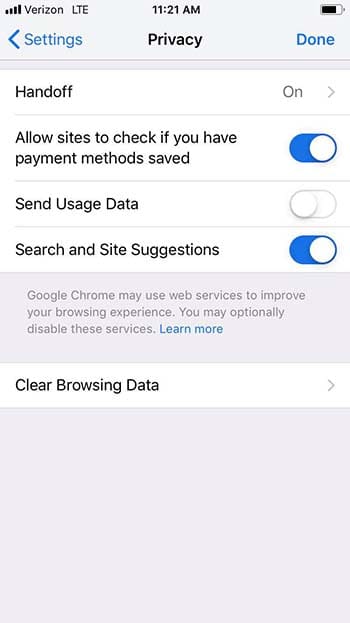Switching browsers has never sounded better.

According to the Washington Post, more than 11,000 tracker cookies were found in Google Chrome. These tracker cookies were making profiles for companies and marketers to help advertise products to you. Interestingly enough, the writer discovered that all of them were blocked when he browsed with Firefox.

How the newest Firefox keeps you safe
Read Now ►How does Google track my data?
If you’re logged into Chrome, these tracker cookies are stealing and sending your personal data. However, even if you aren’t logged in, Google is still working to take your info.
If you have an Android, Google is sending your location data whenever you make a search. Even if you have your location settings turned off, Google will send coordinates instead.
If you are logged into Gmail, Google will track your data just the same as if you’re logged into Chrome.

How to block and kill tracker-cookies on Chrome
![]()
If you are looking to clear out the tracker cookies Google has on you while you’re browsing the internet and block sites from tracking you, there is a way. However, please note that this will sign you out of most websites, so make sure that you remember your passwords!
On your desktop browser
- Open Chrome
- Click on the three vertical dots in the top right
- Go to Settings
- Click Advanced to reveal Privacy and Security
- Enable the option to send a “Do to track” request with your browsing traffic
- Scroll down further to the option to clear browsing data
- Choose how long you want to clear cookie data
- Select the option to clear cookies and other site data
- That’s it, you’re all done
On mobile

- Open the Chrome app
- Click the three horizontal dots at the bottom right corner
- Click settings
- Click privacy
- Select the option to not send usage data
- Go to Clear Browsing Data
- Make sure Cookies, Site Data is selected
- Click Clear Browsing Data
- You’re all set
Please note that not all websites will stop collecting data on you despite you requesting that they do not track your data.
“Many websites will still collect and use your browsing data – for example, to improve security, to provide content, services, ads, and recommendations on their websites, and to generate reporting statistics,” according to Google.
What should I do?

This isn’t the first piece of despairing new info about Chrome to come out lately. Google recently announced that ad blockers essentially won’t work on Chrome unless you pay.

Google: Pay us or your ad blocker won’t work on Chrome
Read now ►That said, we strongly recommend choosing another browser if you want to keep your personal data safe.
The Brave browser has built-in ad blocking. You can also use your favorite Chrome extensions.
Firefox has a whole host of tools that help keep you safe on the internet. From blocking cryptomining attacks to stopping invasive ads, there is no better time to start browsing with Firefox.

Mozilla Firefox
Download now ►Chrome may have the largest market share, but they’re starting to flex that power in scary ways. It’s best to get familiar with a new browser now before something drastic happens that makes you regret hanging on too long.



